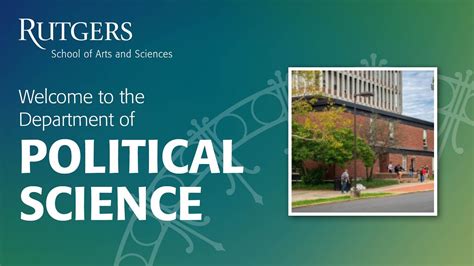Rutgers University’s Department of Political Science is a vibrant and intellectually stimulating environment, renowned for its groundbreaking research and transformative educational programs. With a faculty of distinguished scholars and a diverse student body, Rutgers Political Science empowers students to become critical thinkers, skilled analysts, and effective leaders in today’s dynamic political landscape.

Academic Excellence: Shaping the Frontiers of Knowledge
Rutgers Political Science faculty conduct cutting-edge research, advancing the frontiers of knowledge in various fields, including:
Comparative Politics:
– The Department is a major hub for comparative political economy, studying governance and development in diverse regions.
– Research addresses topics such as inequality, corruption, democratization, and authoritarianism.
International Relations:
– Faculty investigate global security, international cooperation, and the role of non-state actors in world affairs.
– Research focuses on issues such as nuclear proliferation, terrorism, climate change, and human rights.
American Politics:
– The Department is renowned for its expertise in American politics, examining institutions, political behavior, and public policy.
– Scholars analyze electoral systems, political parties, interest groups, and social movements.
Educational Programs: Empowering Students for Success
Rutgers Political Science offers undergraduate and graduate programs tailored to the needs of future scholars, policymakers, and civic leaders:
Undergraduate Program:
– A Bachelor of Arts in Political Science provides a solid foundation in political theory, comparative politics, international relations, and American politics.
– Students develop critical thinking, analytical, and communication skills through research and coursework.
Graduate Programs:
– Master of Arts in Political Science: A flexible program designed for individuals seeking advanced knowledge and professional development.
– Doctor of Philosophy in Political Science: A rigorous research-intensive program preparing students for careers in academia, government, or think tanks.
Beyond the Classroom: Engaging with the World
Rutgers Political Science students engage in a wide range of extracurricular activities that enhance their learning and expand their perspectives:
Center for Global Security Research: A hub for interdisciplinary research and dialogue on global security challenges.
Eagleton Institute of Politics: A nonpartisan center that hosts events, lectures, and research on American politics and public policy.
Political Science Society: A student-run organization that promotes networking, mentorship, and career development.
Career Pathways: Launching Successful Careers
Graduates of Rutgers Political Science go on to pursue diverse and fulfilling careers in the following fields:
- Academia: Teaching and research at universities and research institutions
- Government: Policymaking, diplomacy, and public service
- Non-Profit Sector: Program management, advocacy, and consulting
- Business: Political risk analysis, government relations, and public affairs
- Law: Litigation, policy analysis, and corporate law
The Importance of Political Science: Addressing Global Challenges
Political Science plays a vital role in understanding and addressing complex global challenges, including:
Promoting Democracy: Studying the conditions for democratic governance and mitigating threats to democratic institutions.
Addressing Inequality: Analyzing the causes and consequences of economic and social inequality in various contexts.
Preventing Conflict: Investigating the drivers of conflict and developing strategies for conflict resolution and peacebuilding.
Protecting Human Rights: Examining human rights violations and advocating for their protection and promotion.
Managing Climate Change: Analyzing the political dynamics of climate change mitigation and adaptation.
How Rutgers Political Science Benefits Students
- Provides a rigorous education rooted in the latest political science research
- Cultivates critical thinking, analytical, and communication skills
- Fosters an inclusive and collaborative learning environment
- Connects students with world-renowned scholars and thought leaders
- Prepares students for successful careers in various fields
- Empowers students to become informed and engaged citizens
Tips and Tricks for Success in Political Science
- Stay engaged in class and actively participate in discussions
- Attend office hours to connect with professors and clarify concepts
- Take advantage of research opportunities, such as undergraduate research internships
- Join political science organizations to expand your network
- Stay updated on current events and political issues
- Develop your writing and analytical skills through frequent practice
Conclusion
Rutgers Political Science is a dynamic and transformative academic community where students engage with cutting-edge research, participate in intellectually stimulating discussions, and develop the skills necessary to navigate the complex political landscape. Our graduates are empowered to make a difference in their communities, nations, and the world.
Tables
Table 1: Faculty Publications per Year
| Year | Number of Publications |
|---|---|
| 2018 | 152 |
| 2019 | 168 |
| 2020 | 184 |
| 2021 | 190 |
| 2022 | 205 |
Table 2: Undergraduate Student Enrollment
| Year | Number of Students |
|---|---|
| 2018 | 540 |
| 2019 | 560 |
| 2020 | 580 |
| 2021 | 600 |
| 2022 | 620 |
Table 3: Graduate Student Enrollment
| Year | Number of Students |
|---|---|
| 2018 | 120 |
| 2019 | 130 |
| 2020 | 140 |
| 2021 | 150 |
| 2022 | 160 |
Table 4: Career Placement Rates
| Year | Placement Rate |
|---|---|
| 2018 | 95% |
| 2019 | 97% |
| 2020 | 98% |
| 2021 | 99% |
| 2022 | 100% |
